
"The anti-human polyclonal capture reagents are some of the most robust reagents I have used in my biophysical and biochemical studies so far. Overall, the anti-Fc reagents regardless of the host or capturing species provides a robust capturing ability with minimum cross-reactivity to other species." Full review.
Rupesh Nanjunda,Rating: 5.0

"I have used a wide variety of secondaries and Jackson ImmunoResearch has consistently been the best. The fluorophores are bright and stable and their selective (x reactivity removed) secondaries have always shown species specificity in multiple labeling."
Janet Duerr, Ohio UniversityRating: 5.0
High-quality reagents are essential to ensure accuracy, sensitivity, and reproducibility - the key requirements of a reliable diagnostic test. Here we describe some of the critical considerations necessary for selecting the right detection reagent for your immunoassay.
Assay development will be governed by the sensitivity, speed, and ease of use you require, alongside access to equipment and how the test is to be administered. The most common serological tests are:
Want to know more about serological testing? View our serology page here.
Immunoassays can detect a diverse array of molecules such as a structural motif on a virus particle or allergen or immunoglobulins from biological fluids of hyperimmune patients, such as serum or saliva. Assays can set up in a variety of formats such as, direct, indirect, sandwich, and competitive. Indirect and sandwich assays are the more commonly used formats. They offer a higher level of sensitivity by way of the conjugated secondary antibody amplifying the signal from the target molecule.
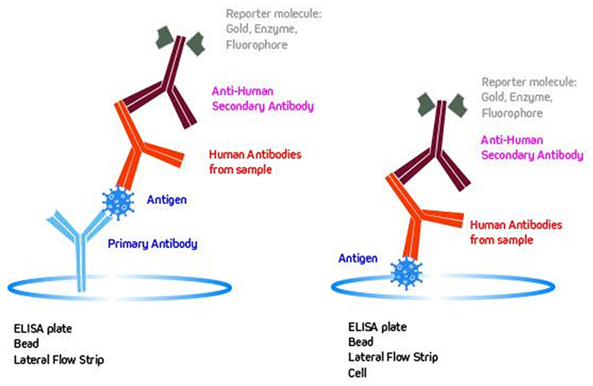
Polyclonal antibodies are ideally suited for the detection component of the immunoassay. Their ability to bind multiple epitopes on one primary antibody results in inherent amplification which leads to higher test sensitivity and selectivity.
If you’re looking to create diagnostic tests for human patients it is likely that you’ll need anti-human Ig antibodies at some stage of the test.
It’s not only human patients that need accurate and sensitive diagnostic and surveillance testing. With zoonotic disease disrupting people’s lives across the world, animal testing will become more prevalent. We manufacture antibodies with specificity against a wide range of other species, from farm animals such as pigs, cattle, sheep, and poultry, through to companion animals such as cats and dogs.
Serological tests typically do not have species to species cross-reactivity complications due to the nature of their design. Table 1 details suggested anti-human antibodies suitable for immunoassays where cross-reactivity from other species proteins will not be present.
| Product Code | Description | Detects |
|---|---|---|
| 109‑005‑008 | Goat Anti-Human IgG, Fcγ fragment specific | IgG only |
| 109‑005‑129 | Goat Anti-Human IgM, Fc5μ fragment specific (min X Bov Sr Prot) | IgM only |
| 109‑005‑011 | Goat Anti-Human Serum IgA, α chain specific | IgA only |
JIR manufactures Anti-Human Antibodies with strong affinity and avidity in mice, rabbits, alpacas, and donkeys, but those most commonly used for serological tests are made in goats. Larger animals facilitate the production of greater volumes of raw material. With the increased pressures of the COVID 19 response, JIR production has increased to accommodate highly requested items related to the outbreak. Our goal is to ensure the best products are selected for large scale assay and kit development with cost-per-assay in mind.
We compared two popular host species, Rabbit and Goat to identify any difference in detection of human IgG, IgM, and IgA by ELISA.
The following ELISAs demonstrate that the specificity and sensitivity of JIR Goat Anti-Human and Rabbit Anti-Human antibodies are comparable for detecting IgG, IgM or IgA.
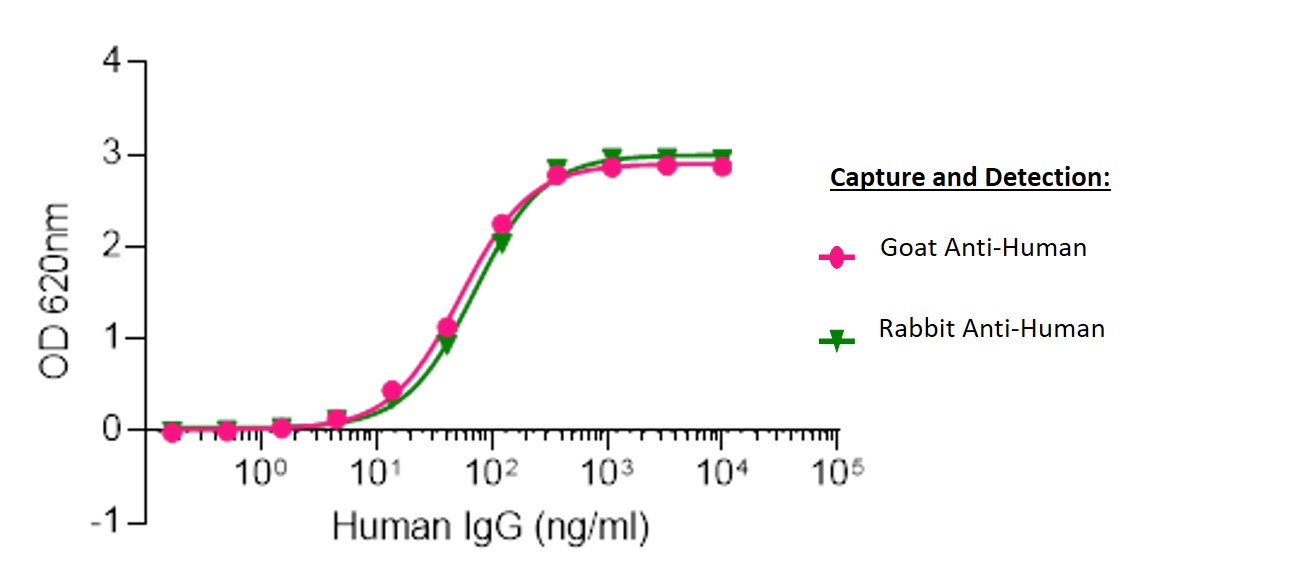
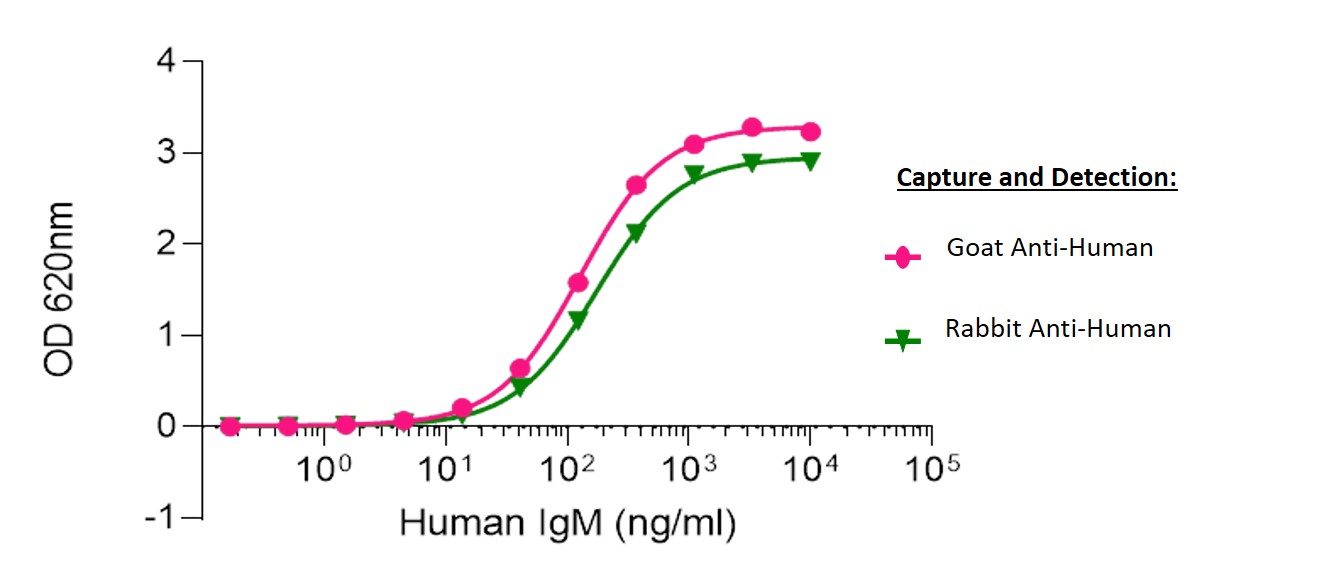
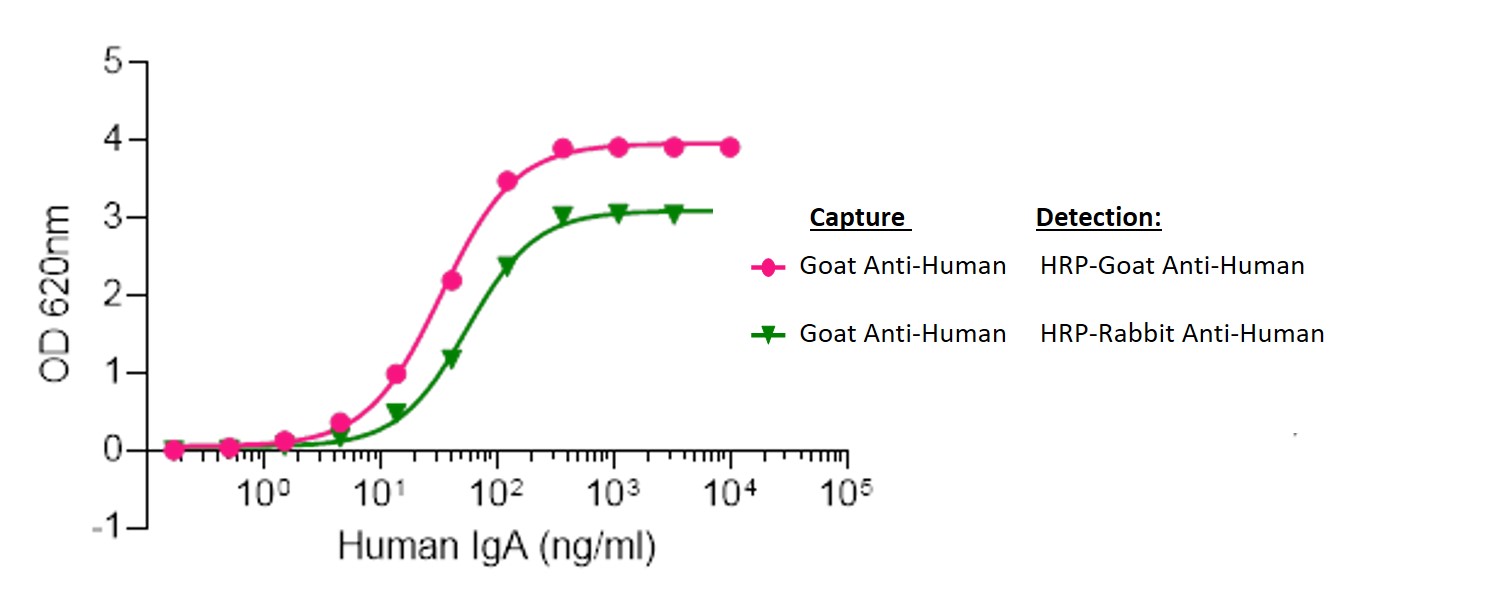
When immunoglobulin specificity needs are paramount you can trust JIR secondary antibodies to differentiate with exquisite accuracy. Figure 5 shows the specificity of JIR Anti-Human IgG (109‑035‑008) and JIR Anti-Human IgM (109‑035‑129) for their intended target Ig in the presence of other immunoglobulins.
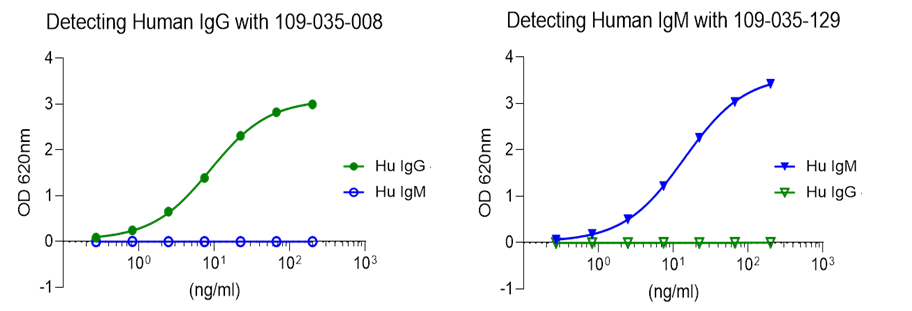
Pan specific antibodies allow the measurement of total Ig of two or more immunoglobulin classes. These products will not differentiate IgG, IgM, and IgA
| Product Code | Description |
|---|---|
| 109‑005‑127 | Goat Anti-Human IgG + IgM (H+L) (min X Bov Sr Prot) |
| 109‑005‑064 | Goat Anti-Human IgA + IgG + IgM (H+L) |
In many serological assays, antibodies from additional species may be present. For example, a mouse or rabbit antibody may be used for capturing antigen to which a human antibody may bind. In these cases, background signal is possible due to cross-reactivity of the anti-human antibody with the antibody from the additional species. For human serological assay designs utilizing antibodies from other species, JIR offers antibodies cross-adsorbed (min X) against common primary antibody hosts to reduce the risk of cross-reactivity. Table 3 details popular Goat Anti-Human antibodies cross-adsorbed against a range of common species including, bovine, horse, mouse and rabbit.
| Product Code | Description | Cross-Reactivity Considerations |
|---|---|---|
| 109‑005‑190 | Goat Anti-Human IgG, Fcγ fragment specific (min X Bov, Ms Sr Prot) | Only in the absence of rabbit and horse serum proteins |
| 109‑005‑098 | Goat Anti-Human IgG, Fcγ fragment specific (min X Bov, Hrs, Ms Sr Prot) | Will cross-react with rabbit serum proteins if present |
| 109‑005‑170 | Goat Anti-Human IgG, Fcγ fragment specific (min X Bov, Ms, Rb Sr Prot) | Only in the presence of rabbit serum proteins |
We can manufacture and supply most standard inventory secondary antibodies in bulk volumes upon request.
Customers can be completely confident of product quality, consistency and minimal lot to lot variation. Our goal is providing the highest quality of product with outstanding service.
Jackson ImmunoResearch Laboratories, Inc. is certified by BSI to ISO 9001:2015 under certificate number FM 545248.
Contact our Sales team for more information.